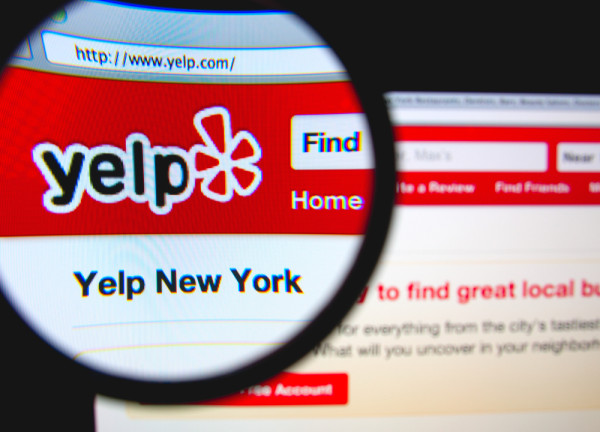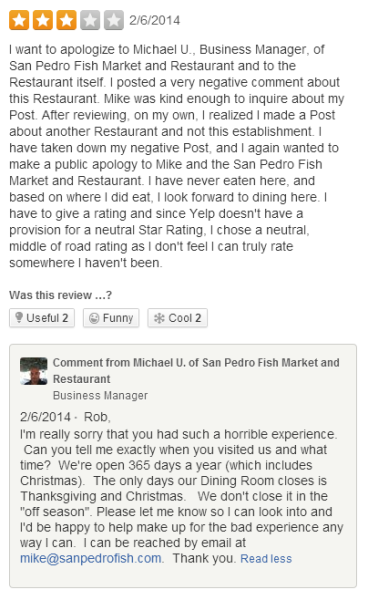
For small businesses, online reviews can be a great blessing or a curse. If your company has good reviews, your brand will obviously hold a higher level of credibility than some of your competitors and higher review rankings will make it easier to maintain a visible presence online. However, bad reviews increase your company’s visibility online even more than great reviews, though with very different consequences. Too many negative reviews can make customers lose interest and flock to a competing online business or an already established corporation.
According to a recent study by online dispute resolution service PeopleClaim, online reviews are much more important than many business owners realize.
- 75% of reviews posted on review websites are positive.
- 95% of unhappy customers will return to your business if an issue is resolved quickly and efficiently.
- 71% agree that consumer reviews make them more comfortable that they are buying the right product/service
- 70% of people consult reviews/ratings before purchasing.
- People are 63% more likely to purchase a product from a site if it has product ratings and reviews.
- Customer reviews create a 74% increase in product conversion
The 2013 Local Consumer Review Survey by Bright Local found very similar data.
- 85% of consumers say that they read online reviews for local businesses (up from 76% in 2012)
- 67% of consumers read 6 reviews or less* (up from 52% in 2012)
- 73% of consumers say positive customer reviews make them trust a business more (up from 58% in 2012)
- 79% of consumers trust online reviews as much as personal recommendations (up from 72% in 2012)
This research just further proves that it is more important than ever for small businesses to harness the power of online reviews in order to grow. Getting great reviews can be challenging, but it is something that is definitely well worth your time. Here are some ways to get more positive reviews and lessen the impact of negative ones.
Step 1: Claim your listing on all review sites.
Yelp, Google Places for Business and other similar sites allow you to claim ownership of your business listing. Once you do this, be sure to upload high-quality photos of your business and make sure that your company addresses, hours of operation, and contact information are correct. Next, write a summary about your business that tells customers what products and services you offer. This not only informs search engines of your presence and the keywords that relate to your business, but it also allows customers to make sure that your business is the one they mean to review long before they start typing. There are few things worse than a case of mistaken identity online, and you certainly don’t want to take a negative review on behalf of some similar company.

Step 2: Increase your online review visibility in “the real world.”
If you own a storefront, make a point of displaying the review sites where your company is active near the checkout areas. Print review requests at the bottom of receipts and have your staff ask for reviews at the end of customer interactions (but don’t be tacky about it!) You should also include a link to your review page in your professional email signature.
Step 3: Ask for feedback.
Many review sites forbid business owners from writing a fake or defamatory review, trading reviews with other businesses, or compensating someone (or being compensated) to write or remove a review. In a recent court case known as Levitt v. Yelp, a few business owners filed several class actions against Yelp that accused Yelp of altering business ratings, hiding positive reviews and only showing negative reviews, extorting businesses that do not advertise on Yelp, etc. While Yelp continues to deny that it does any of these things, the U.S. 9th Circuit of Appeals ruled that even if Yelp was manipulating reviews, it would not amount to extortion. Marsha S. Berzon, a member of the court’s three-judge panel, wrote in the ruling Tuesday to uphold a lower court’s dismissal of the lawsuit:
“The business owners may deem the posting or order of user reviews as a threat of economic harm, but it is not unlawful for Yelp to post and sequence the reviews. As Yelp has the right to charge for legitimate advertising services, the threat of economic harm that Yelp leveraged is, at most, hard bargaining.”
So what does this mean for businesses? Essentially, small businesses should claim their listings on a variety of review sites – not just Yelp. Google Places for Business holds the most momentum in SEO and also factors in reviews from sites across the web.
Instead of waiting for great reviews to magically start rolling in, start letting customers know which review sites you are on. You can even order “Check Us Out on Yelp!” decals for your business and place QR codes in the store to encourage customers to scan and review. After doing business with someone, follow up with them to ask them about their experience. If you don’t ask for feedback, the customer is more likely to post a public review. If you do ask, and they had a poor experience, you at least have the chance to make it up to them before they post that review on Yelp.
Step 4: Respond to Feedback
Look at every review as an opportunity to improve your business. Not only do positive reviews advocate for your business, but negative reviews provide insight into what can be fixed within your company. Immediately respond personally to any reviews you receive, both positive and negative. Be sure to thank the reviewer for their business and react appropriately to negative reviews [LINK TO NEXT POST]. When you receive a positive review, be sure to share it with a message of gratitude on your social networks, tagging the reviewer if possible.
How do you turn leads from your website into loyal customers? Here are some tips: http://t.co/U7yBsV92MY pic.twitter.com/QVgrTPRmaZ
— CyberMark (@CyberMark) September 30, 2014
Step 5: Get active online!
If you are active on your blog, website and social media profiles, your customers are more likely to approach you in one of those ways before posting a negative review. Be sure that your “About” page on your website offers plenty of ways for customers to contact you, but even that may not be enough to convince consumers to come to you first, as they may feel that their complaint will be ignored. However, by attaching a face to your brand through blogging and social media, you can make clients more comfortable with approaching you.
Finally, there is no substitute for good service! If you do not want negative reviews online, then you need to evaluate how you treat your customers offline. Of course, as with everything in life, there will be people who complain about anything. There really is no way to avoid a negative review here and there, but if you respond positively to their review and try to make amends (even if the customer is wrong!), other people will see that the complainant’s review does not hold much weight and that the business owner really cares about the experiences their customers receive.
Business Articles | Business 2 Community
(344)







